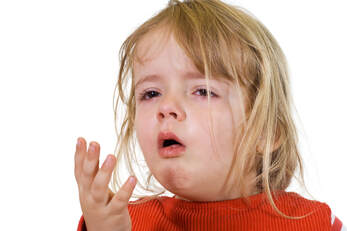Clinically Balanced | Natural Health Blog | Medical Alternatives
 Pertussis is a very contagious respiratory infection caused by a bacterium that causes damage and inflammation to the airways. Many of the cases of pertussis today are caused by the shedding from the vaccine itself. There are 3 stages of pertussis that can last in total up to 12 weeks. Although it’s been called the “100-day cough”, early treatment can make a tremendous difference and even avoid the symptoms altogether. Once infected, the individual is immune between 30 to 70 years. The suggestions below are based on Dr. Suzanne Humphries published article, my own experience with my 3 children that had it at all 3 stages, and further research into the topic. 3 Stages of Pertussis: 1. Stage 1 – Common cold symptoms. Sometimes there are no other symptoms than a cough. This stage lasts about 2 weeks and is the ONLY stage where antibiotics are useful in halting the disease. Colloidal silver is also very helpful in halting the disease at this point. Both kill the bacteria causing the illness. 2. Stage 2 – (The paroxysmal stage) Cough turns into violent coughing spells that make it hard to breathe. The episodes can be terrifying for the individual and their caretaker. The sound that the individual makes trying to catch their breath is the tell tale sound of whooping cough. This stage can last 1 to 10 weeks. High dose Vitamin-C therapy is crucial at this stage and will make a drastic difference in the cough. 3. Stage 3 - The last stage is the repair stage. The coughing spells decrease and the body starts recovering from the illness. This stage can last 2 to 4 weeks. Immediate treatment for this illness is important!! Antibiotic use (azithromycin is the typical prescription) only works within the first stage of the disease (first two weeks). Unfortunately, most pertussis diagnoses don’t occur until the bacteria has taken a good hold of the body, and the “whoop” that occurs is more prevalent. EARLY TREATMENT IS KEY!!! Pertussis is contagious up to 3 weeks after cough starts without treatment. If an antibiotic or colloidal silver is taken, the illness can be contagious from 1 to 5 days, depending how long it takes to kill the bacteria in the body. Children usually do not have other symptoms besides the cough and can attend school without problems after they are no longer contagious. ABSOLUTELY AVOID: • Milk products (milk, cheese, yogurt, macaroni and cheese, etc) • Sugar (including artificial sweeteners) Pertussis care suggestions: Call the doctor to get a prescription if there is a known pertussis outbreak in the area and having any symptoms. Hold on to it and have ready to take if cough progresses. It’s always good to have a plan B. You can try suggestions below first, but keep your doctor in the loop! Antibiotic use has its own set of issues. Use only if needed. Use colloidal silver at very first sign of coughing, or if the individual has been around someone with known pertussis to boost the immune system and prevent illness.
Other helpful remedies include:
Vitamin C dosage: (Information below is from Dr. Suzanne Humphries from the website orthomolecular.org) You can also find this information on Dr. Humphries website at drsuzanne.net. About Vitamin C brands: Use sodium ascorbate NOT Ester-C or calcium ascorbate. For older children and adults Shaklee sustained release Vitamin-C works really well too. Other good brands that Dr. Humphries recommends is Nutribiotic powdered sodium ascorbate, Livon Labs liposomal Vitamin-C (gel form), or Sufficient-C brand powdered ascorbic acid drink mix. The liposomal Vitamin-C is best for breastfed/formula fed babies, and younger children. It is also a good option to use before bed or in the morning. Dosage: Based on Dr. Suzanne Humphries research - 200-375mg per kg in weight divided over 24-hour period. During peak times the body may need even 1000mg per kg per day. 1 kg = 2.2 lbs Examples: A 16 lb baby will need between 1,460mg – 2,737mg of Vitamin-C over a 24 hour period, up to 7,300mg during peak times. The liposomal Vitamin-C is better for breastfed/formula fed babies. Take a finger with some of the gel and swab the inside cheek of the infant. If the baby is still coughing and is constipated you can use the powdered Vitamin-C. Mix a small amount (250mg) into breastmilk or formula. Drip into baby’s mouth with a dropper every 15 minutes. Do not put into baby’s mouth if they are asleep! Directly from Dr. Humphries’s website: “Two to four week infants usually require 1-2 sachets of lipospheric ascorbate per 24 hours. Five to eight week babies usually require 1-3 packs. Treating such very young infants usually requires assistance from a medical practitioner and very close monitoring, often rocking the baby all day and night during the peak days.” Rocking the baby will help the mucus to move up and out of the body, and also comforts them. If a breastfeeding mother is having a hard time keeping up with milk demands she can take fresh garlic. There are compounds in garlic that increase milk production. A 50 lb child will need between 4,540mg – 8,500mg of Vitamin-C over a 24-hour period, up to 22,700mg during peak times. A 110 lb child will need between 10,000mg – 18,750mg of Vitamin-C over a 24-hour period, up to 50,000mg during peak times. Children attending school can have the powdered Vitamin-C in a water bottle that they just sip all day long while away. Parents should also give the school nurse Liposomal Vitamin-C packets (or pill form) to administer to child at lunchtime or every 2 hours (whatever time frame the body is requiring at that time). Unused Vitamin-C by the body will be eliminated through the bowels. A good determination is how the body reacts. If the cough is severe and breathing is labored then increase the frequency, dosage, or both. If the individual starts having diarrhea then reduce Vitamin-C. It means their body does not require as much. This will also give an indication of how far along the individual is on the “100 day cough”. Hopefully, with using the treatments listed that number of days will be less. The sooner the bacteria is killed the less damage to the cilia in the esophagus. This results in a quicker recovery. It is possible, and likely, to stop the progression of the illness altogether if caught soon enough. To learn more about Pertussis treatment options, including how a hospital used homeopathy successfully, take a look at the Handbook of Home Remedies. You can find it in the "Book" section of this website. Elaine Gorski
0 Comments
|
AuthorsElaine Gorski is a licensed occupational therapy assistant and certified holistic health coach. Archives
December 2021
Categories |
DISCLAIMERS:
*These statements have not been evaluated by the Food and Drug Administration.
The products or suggestions listed are not intended to diagnose, treat, cure, or prevent any disease.
Information provided is NOT occupational therapy, nor is it considered medical advice on your condition.
If you are looking for occupational therapy services, please contact an Occupational Therapist for an evaluation.
Take responsibility for your own health. Find answers that work for you.
Look for support groups that share your chronic condition. Many times those with personal experience will share answers they have
found on their journey back to health. The purpose of this website is to guide you to be responsible for your own health. That includes finding the appropriate help when needed.
If you would like to use an article on your site please email us. This content may be copied in full, with copyright, contact, creation and information intact, without specific permission, when used only in a not-for-profit format and credit for author is given. If any other use is desired, permission in writing from the respective author is required.
*These statements have not been evaluated by the Food and Drug Administration.
The products or suggestions listed are not intended to diagnose, treat, cure, or prevent any disease.
Information provided is NOT occupational therapy, nor is it considered medical advice on your condition.
If you are looking for occupational therapy services, please contact an Occupational Therapist for an evaluation.
Take responsibility for your own health. Find answers that work for you.
Look for support groups that share your chronic condition. Many times those with personal experience will share answers they have
found on their journey back to health. The purpose of this website is to guide you to be responsible for your own health. That includes finding the appropriate help when needed.
If you would like to use an article on your site please email us. This content may be copied in full, with copyright, contact, creation and information intact, without specific permission, when used only in a not-for-profit format and credit for author is given. If any other use is desired, permission in writing from the respective author is required.
LEGAL:
© Copyright 2021-2024 Clinically Balanced. All Rights Reserved.

 RSS Feed
RSS Feed